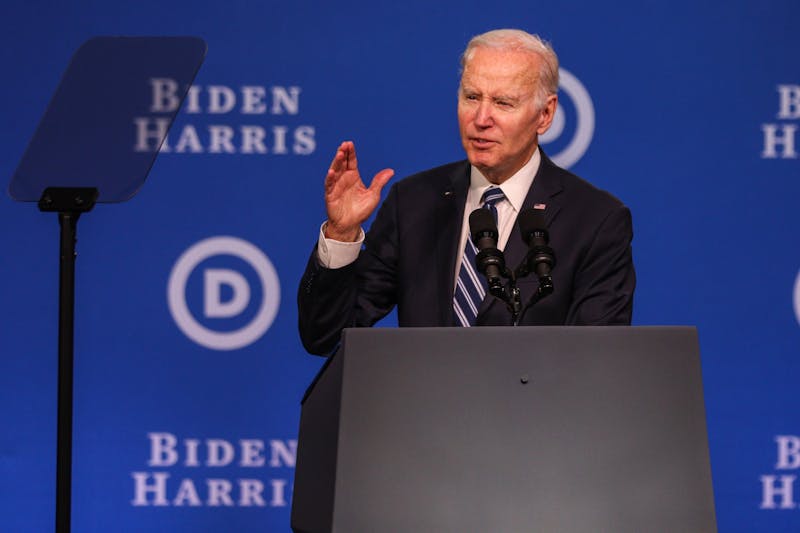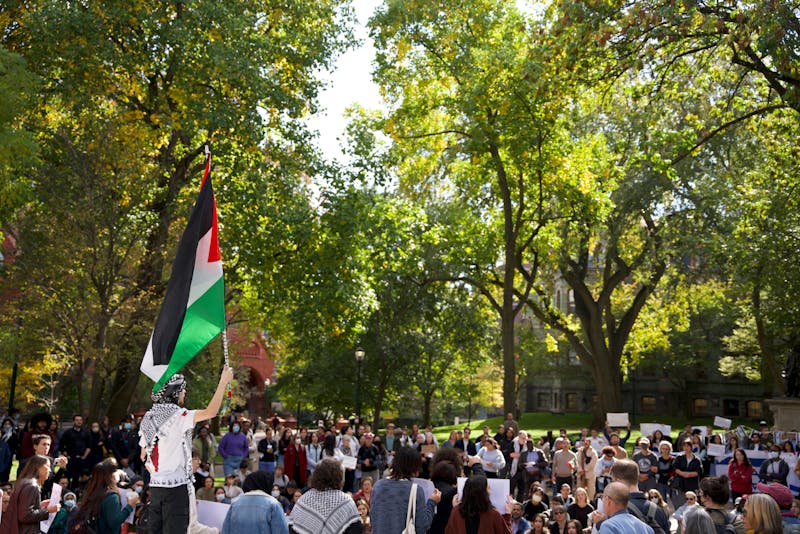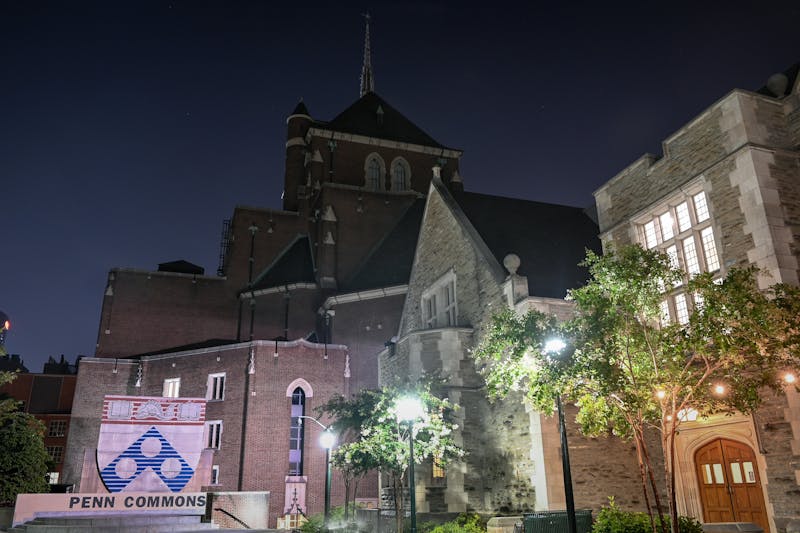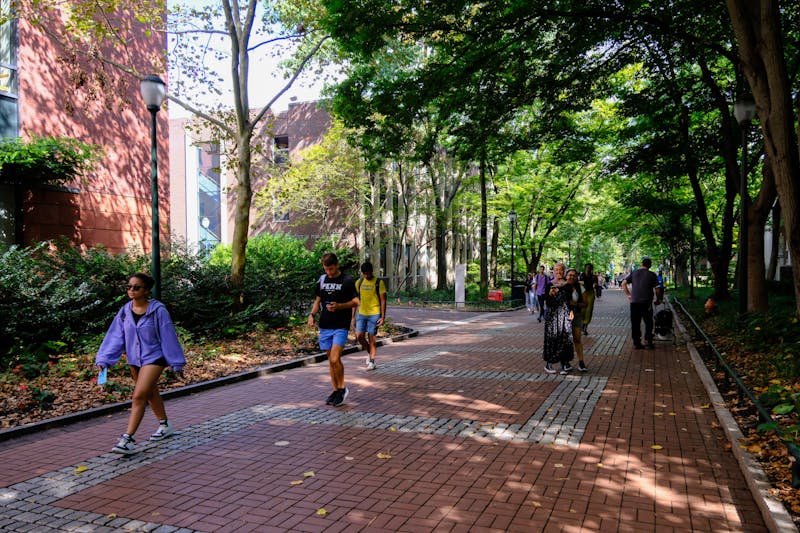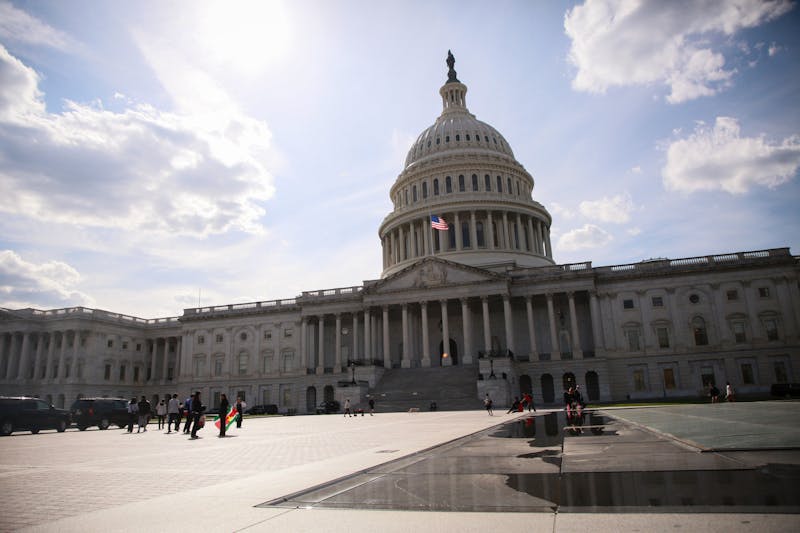
Penn President Liz Magill will resign, according to an email sent to the Penn community around 4:30 p.m. on Dec. 9.
Penn has been in turmoil with multiple controversies since this fall, beginning with the Palestine Writes Literature Festival and intensifying after Hamas' attack on Israel on Oct. 7 and the ongoing violence in the region.
Throughout the past several months, students, donors, and faculty have raised questions about free expression on campus and the University's response to antisemitism and Islamophobia.
Here is the recap of the events leading up to Magill's resignation, ranging from the Palestine Writes Literature Festival to backlash from donors and trustees.
Palestine Writes Literature Festival
Controversy and concerns about antisemitism started in late August and September with the lead up to the Palestine Writes Literature Festival, which took place from Sept. 22 to Sept. 24.
The Festival celebrates itself as the "only North American literature festival dedicated to celebrating and promoting cultural productions of Palestinian writers and artists." While not officially sponsored by the University, events were held at Irvine Auditorium, Penn Commons, and other University spaces.
The festival sparked fear and outrage among some Penn students, alumni, and community members as well as national Jewish groups who objected to the inclusion of speakers who they said have antisemitic histories.
In response, Penn President Liz Magill, Provost John Jackson Jr., and School of Arts and Sciences Dean Steven Fluharty published a statement addressing criticism on Sept. 12. Administrators condemned antisemitism and expressed support for the free exchange of ideas, including the “expression of views that are controversial and even those that are incompatible with our institutional values.”
In response to Magill’s statement, 36 Penn faculty members signed a letter on Sept. 17 in support of the Palestine Writes festival, indicating “deep concern” with administrators’ statement on the festival and calling on Magill to amend the statement to clearly support a diversity of views and communities on campus.
Students on all sides of the issue also responded with anger. On Sept. 22, over 200 Penn community members, including students, signed a letter asserting that the event violated several University standards and would create a “hostile” environment for Jewish students. Another group accused Magill of “marginaliz[ing] Palestinian students” by conflating calls for Palestinian liberation with antisemitism.
Palestinian and Arab affinity groups continued to defend the festival. Penn Arab Students Society, Penn Against the Occupation, and Almaydan — the Forum of Penn Arab Graduate Students — published a joint statement on Sept. 17, asserting that the festival was "a long-awaited affirmation of their belonging and worth."
Amid the controversy, Penn Hillel offered a campus-wide show of support for Jewish students and demanded further University action. Their Shabbat Together event was held on Sept. 22 for all students, politicians, and alumni to promote unity on campus and fight antisemitism.
The festival was still held from Sept. 22 to Sept. 24. Organizers sold over 1,500 tickets and garnered over 1,000 additional views on livestream. Participants included Penn students and faculty. Pink Floyd's lead singer, Roger Waters, who was among the most controversial speakers at the festival, attended via livestream.
Donor and trustee backlash
Concerns about antisemitism from donors and trustees started amid the Palestine Writes Literature Festival controversy.
Multiple current members of Penn's Board of Trustees signed an open letter on Sept. 21 to Magill calling on her to take additional steps to distance the University from the Palestine Writes Literature Festival.
The letter was signed by more than 2,000 Penn alumni and University affiliates, who expressed “deep concerns'' about the festival. Notable signatories included Robert Stavis, Andrew Heyer, and Marc Rowan — who is also chair of the Wharton Board of Advisors.
The pushback from alumni intensified after Hamas’ Oct. 7 attack on Israel. Following the attack, dozens of donors pulled their support and openly criticized Magill for what they saw as her failure to combat antisemitism due to the University's response.
Rowan was the first to publicly pull his donations, calling on Magill and University Board of Trustees Chair Scott Bok to step down, emphasizing that the attacks on Israel prove that “words and ideas matter.”
On Oct. 14, Vahan Gureghian, who served as a trustee since 2021, announced his resignation from the Penn Board of Trustees. He cited Penn's “embrace of antisemitism” and response to the Palestine Writes Literature Festival as driving factors in his decision.
One day later, 1987 College graduate Jon Huntsman Jr. — a former University trustee, governor of Utah, and United States ambassador — followed suit in announcing that he was ending all donations to Penn. Huntsman, whose family has donated tens of millions to Penn over the course of three generations, wrote in an email to Magill that the University had become "almost unrecognizable" due to administrators' response to antisemitism.
While speaking at an Oct. 16 Heritage Foundation event in Washington, D.C., 1965 Wharton graduate Ronald Lauder also confirmed he would also halt donations to Penn. The announcement came one week after threatening to end his financial support.
Throughout October, dozens of additional donors, including 1964 Penn Carey Law graduate Henry Silverman and 1967 College graduate Stephen Levin, pulled their financial support, joining in the backlash.
Administration, faculty, and the debate over free speech
After violence broke out between Israel and Hamas, Penn announced that it would defer all University-affiliated travel to Israel, Gaza, and the West Bank for the foreseeable future. In an email to the Penn community, Magill and Jackson wrote that they were “devastated by the horrific assault on Israel.”
On Oct. 15, Magill issued a second statement calling the Hamas attack a “terrorist assault” and distancing Penn from certain festival speakers with “a public history of speaking out viciously against the Jewish people.”
Three days later, Magill warned that Penn would not tolerate hate speech amid recent demonstrations for Israel and Palestine. She acknowledged that “deeply held and disparate views of the Israel-Palestine conflict” were causing tension on campus and emphasized the University’s support for free speech.
Penn faculty members spoke out in response to ongoing violence between Israel and Hamas. On Oct. 24, over 300 faculty members signed an open letter supporting Israel’s right to defend itself against the Hamas attacks. The letter praised Magill’s Oct. 15 statement condemning Hamas and called for respectful dialogue on campus, stating that “freedom of speech does not mean freedom from consequences.”
Meanwhile, the University’s response to the Palestine Writes festival drew criticism on grounds of academic freedom. On Oct. 28, the Penn chapter of the American Association of University Professors published a statement claiming that administrators and donors’ response to the Palestine Writes Literature Festival “impaired” basic academic functioning.
In the statement, AAUP-Penn’s executive committee wrote that the absence of faculty consultation about some parts of the University's response to the festival — which included eliminating course requirements within the Department of Near Eastern Language and Civilizations — represented a “clear violation of academic freedom.”
The response of university leadership also prompted comparisons to other free speech controversies on campus. In an op-ed to The Daily Pennsylvanian, David Shapiro — lawyer of Penn Carey Law professor Amy Wax — criticized Penn’s “glaring double standard” in failing to protect his client’s academic freedom given recent events. He condemned Magill’s “hypocrisy” on free speech for defending the Palestine Writes festival while the University sought to sanction Wax.
On Nov. 20, hundreds of faculty and staff members across the country signed an open letter calling on Penn to defend faculty, students, and staff who were facing targeted harassment for their pro-Palestinian views. The letter asked that Magill release a statement in support of the “academic freedom and safety of Penn faculty being maligned and attacked.”
The attempt of the Jewish student group Penn Chavurah to screen the documentary “Israelism” further added to the growing debate over free speech. The film follows the lives of two young American Jews who, after witnessing Israel’s treatment of Palestinians, develop a conflicting relationship with Israel. The documentary has drawn controversy from national organizations for its critical portrayal of Israel.
Penn denied Penn Chavurah's request to screen the documentary. On Nov. 28, AAUP-Penn wrote in an “urgent message” that the University’s refusal to allow the film screening violated academic freedom. AAUP-Penn’s executive committee announced that Penn Middle East Center director Harun Küçük resigned in response to “inappropriate pressure from administrators.” Küçük’s resignation generated concern among Penn community members.
Penn Chavurah screened “Israelism” in Meyerson Hall on Nov. 28 despite alleged threats of disciplinary action from the University.
On Dec. 1, the Middle East Studies Association expressed “dismay” over Penn’s decision to prevent the screening of “Israelism,” claiming that the ban endangered the principles of academic freedom.
Antisemitic incidents
Many instances of antisemitism have taken place on campus this fall semester, and the University has announced plans to combat different forms of hate across campus.
On Sept. 13, two days before the Jewish holiday of Rosh Hashanah, a spray-painted swastika was discovered in a spray room on the fourth floor of Meyerson Hall in the Stuart Weitzman School of Design. The swastika has since been painted over.
On Sept. 21, one day before the Palestine Writes Literature Festival was scheduled to begin and a few days before the Jewish holiday of Yom Kippur, an individual vandalized the Penn Hillel building while shouting antisemitic rhetoric. The individual “started smashing things, yelling ‘F**k the Jews’ and ‘They killed JC’” upon entry, according to a witness.
A religious structure belonging to Chabad at Penn — intended to be used for the Jewish holiday of Sukkot — was vandalized on Sept. 28. At the time, the Division of Public Safety told the DP that it had not identified a connection to any antisemitic meaning or group.
On Oct. 16, an individual was seen tearing down posters of Israeli hostages and pushing a bystander at a counter-demonstration to a pro-Palestinian rally. The individual was taken into custody. DPS later confirmed that the individual — who is not affiliated with Penn — was charged with simple assault and disorderly conduct.
On Oct. 20, a vacant property managed by Campus Apartments next to the Alpha Epsilon Pi fraternity chapter house was vandalized with antisemitic graffiti reading “The Jews R Nazis.” AEPi describes itself as “the world’s Jewish college fraternity” and David Adelman, the chair of the Philadelphia Holocaust Remembrance Foundation, owns Campus Apartments.
Following the incident, DPS wrote to the DP that they would investigate the incident as “a potential hate crime.”
Penn also committed extra funding in October to meet Hillel’s extra security needs through the end of the 2024-25 school year.
As a result of these instances — and other allegations of antisemitism on campus — Magill announced a University-wide action plan to combat antisemitism on Nov. 1. The plan received mixed reactions from Penn community members, with some saying that the plan does not provide enough support to either Jewish or Palestinian communities on campus.
Multiple Penn staff members received antisemitic emails threatening violence against Jewish community members and naming Penn Hillel and Lauder College House on Nov. 6. DPS was notified of the threats and conducted safety sweeps of Hillel and Lauder, finding "no credible threat" at the time.
Lauder College House is named after the Lauder family, which includes 1965 Wharton graduate Ronald Lauder. Lauder is president of the World Jewish Congress, a global alliance of Jewish community groups and associations.
At the time, Penn Police and the FBI said that they were conducting a joint investigation into a potential hate crime. Magill wrote to the Penn community that Penn Police would increase its security presence throughout Penn in response to the threats.
On Nov. 9, Penn denounced the projections of pro-Palestinian messages onto campus buildings as antisemitic and “vile.”
The messages, which were posted on the Instagram stories of pro-Palestinian groups Penn Against the Occupation and the Philly Palestine Coalition, were projected onto Huntsman Hall, Irvine Auditorium, and Penn Commons.
The images displayed phrases such as "Let Gaza live," "From the river to the sea, Palestine will be free," "Zionism is racism," "Penn funds Palestinian genocide," "From West Philly to Palestine, occupation is a crime," "Free Palestine," "Liz Magill is complicit in genocide," and "10,000 murdered by Israeli occupation since October 7."
The Brandeis Center, a Jewish legal rights advocacy group, filed a federal complaint on Nov. 9, alleging that Penn violated Title VI of the Civil Rights Act of 1964 by failing to respond to the harassment of Jewish students. The Brandeis Center complaint refers to Penn’s campus as a “hostile environment for its Jewish students” and alleges that Penn has failed to take measures “reasonably calculated to end the harassment, eliminate any hostile environment, and prevent the harassment from recurring.”
On Nov. 16, the U.S. Department of Education opened investigations into Penn and six other schools over alleged instances of antisemitism and Islamophobia under Title VI of the Civil Rights Act of 1964. At the time, a University spokesperson told the DP that the University looked forward to cooperating fully.
Two Penn students filed a lawsuit against the University on similar grounds on Dec. 5.
On-campus activism
Over the past few months, the University has experienced a substantial increase in student activism by pro-Israel and pro-Palestinian organizers. While this activism has remained peaceful, the rhetoric used by demonstrators — and some specific actions — has been criticized.
Shortly after the Oct. 7 Hamas attack on Israel, nearly 200 Penn community members gathered for a vigil in solidarity with Israel at the LOVE statue.
“I wish that we weren’t here right now,” Executive Director at Penn Hillel Rabbi Gabe Greenberg said at the vigil.
On Oct. 16, over a hundred Penn community members gathered in front of Van Pelt Dietrich Library and rallied for Palestine for over seven hours. The event — which stood in solidarity with Palestine and critiqued Magill’s recent statement for avoiding mentions of ongoing violence against Palestinians — was met with a counter-demonstration of students and community members holding Israeli flags and news articles about the conflict, including the hostages held by Hamas.
A similar walkout in support of Palestinians was held two days later. The walkout included 200 pro-Palestinian supporters gathered for a walkout and vigil. 50 Israel supporters stood quietly nearby, and other Israel supporters, separate from the first group, later marched down Locust Walk and stood behind the first group on College Green.
On Oct. 20, around 400 Penn community members rallied in support of Israel, emphasizing Jewish unity while urging Penn to denounce pro-Hamas and antisemitic rhetoric that some allege is present on campus.
Another pro-Palestinian demonstration was held on Oct. 25, when around 200 Penn and Drexel community members participated in a national student walkout. The demonstrators critiqued messaging from their universities, donors, and the media that allegedly neglect Palestinian narratives.
At a Nov. 3 rally, around 300 Penn community members and alumni rallied in support of Israel and criticized the Penn administration’s response to antisemitism on campus.
On Nov. 9, around 100 Penn community members participated in a national walkout demanding a ceasefire in Gaza. Attendees also condemned Penn President Liz Magill’s responses to the Israel-Hamas war and noted their solidarity with other campus groups, such as Fossil Free Penn and Police Free Penn.
Shortly afterward, on Nov. 13, around 200 Penn community members gathered for a vigil at the LOVE statue to mourn the loss of Palestinian lives.
Starting on Nov. 14, the Freedom School for Palestine — a self-identified collection of Penn students, faculty, staff, and alumni — occupied the ground floor of Houston Hall and began a multi-day teach-in to protest the University's response to the Israel-Hamas war, alleging a lack of support for pro-Palestinian students and faculty.
The teach-in continues with programming, and students have described it as an educational space not seen elsewhere at the University.
On Dec. 3, a pro-Palestinian march across Philadelphia culminated in a rally of over 500 attendees at 40th and Market streets. The rally was hosted in coordination with a vigil for the University City Townhomes, and the pro-Palestinian demonstrators marched from Center City along Walnut Street to join the vigil.
At the same time as the march, several businesses near campus along the route of the march were graffitied with messages both condemning Penn and expressing pro-Palestinian and anti-Israel sentiments. Graffiti included the phrases "F**k the [Israel Defense Forces]," "Intifada," and "Free Palestine." DPS told the DP that they were working to identify the individuals responsible for the graffiti.
At several of these demonstrations, demonstrators have used pro-Palestinian chants, including “From the river to the sea, Palestine will be free” and “There is only one solution, intifada, revolution.”
Some critics argue that “From the river to the sea, Palestine will be free” insinuates a desire to eliminate Israel and its people, while proponents say that the line asserts the boundaries for the creation of an independent Palestinian state. Intifada also refers to historic rebellions in Israeli-Palestinian history.
To many Palestinians, the Intifada represents a fight for liberation, while to many Israelis, it represents a threat of terrorism against Jews.
Donate to The Daily Pennsylvanian to continue to support student journalism. Click here to donate.
The Daily Pennsylvanian is an independent, student-run newspaper. Please consider making a donation to support the coverage that shapes the University. Your generosity ensures a future of strong journalism at Penn.
Donate







